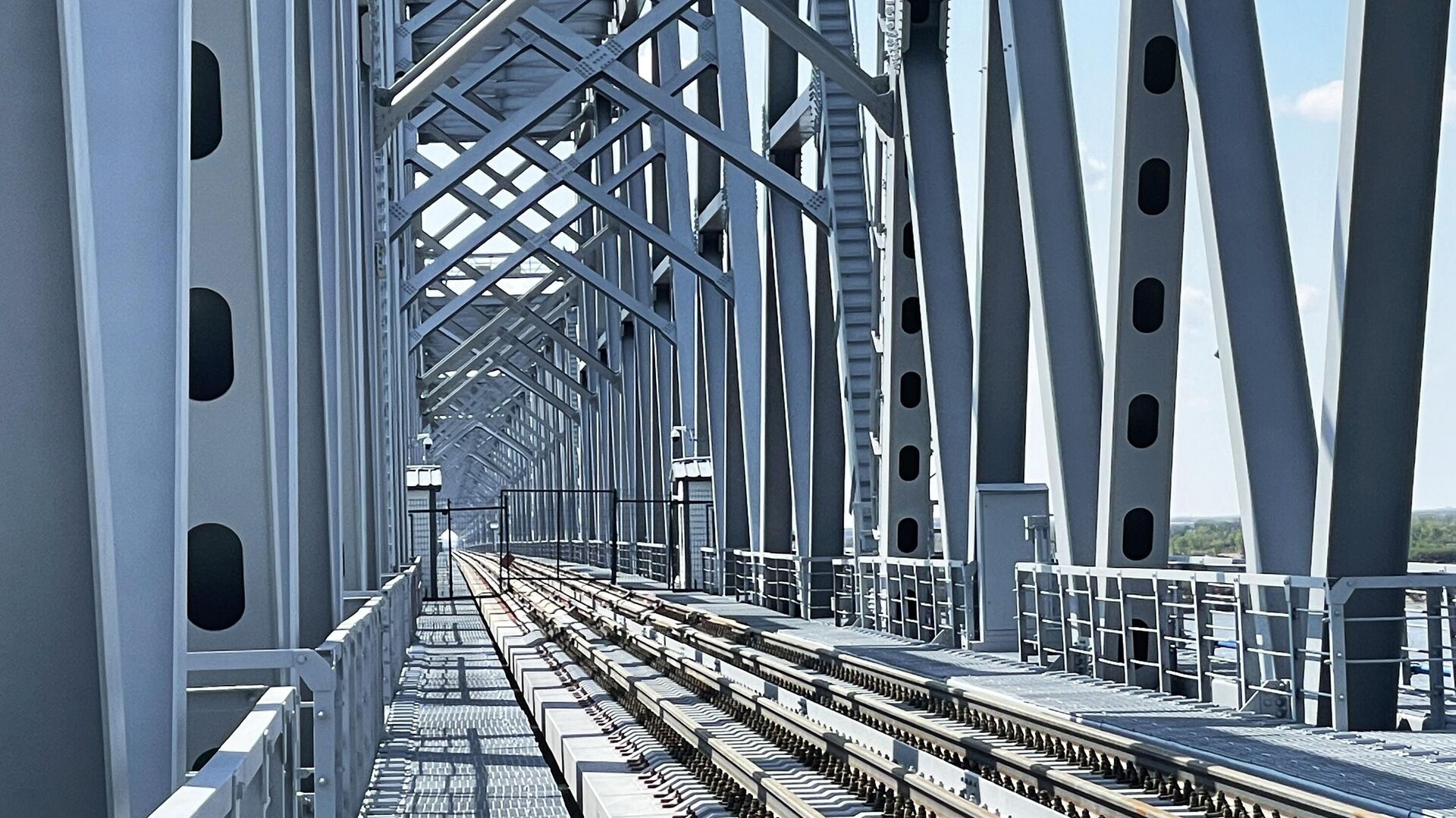https://sputnikglobe.com/20230728/first-chinese-cargo-train-arrives-in-russia-via-bridge-over-amur-river-1112222892.html
First Chinese Cargo Train Arrives in Russia Via Bridge Over Amur River
First Chinese Cargo Train Arrives in Russia Via Bridge Over Amur River
Sputnik International
The first cargo train from China arrived in Russia via a railway bridge over the Amur River, the Russian Direct Investment Fund (RDIF) said on Friday.
2023-07-28T14:41+0000
2023-07-28T14:41+0000
2023-07-28T14:46+0000
economy
russian economy under sanctions
russian direct investment fund (rdif)
russia
china
amur river
people's republic of china
kirill dmitriev
https://cdn1.img.sputnikglobe.com/img/07e7/07/1c/1112222508_0:188:2971:1859_1920x0_80_0_0_808018164032f9fdd2271e73c5b2b0ee.jpg
"The RDIF announces the arrival of the first cargo train from China to Russia via the railway bridge over the Amur River. The bridge connects a section of the interstate border between the settlements of Nizhneleninskoe in the Jewish Autonomous Region and Tongjiang in the Heilongjiang province of the People's Republic of China," the fund said in a statement. Russia has exported a total of over 1.6 million tonnes of different cargoes to China through the bridge since the beginning of 2022. Checkpoints are now operating 24 hours a day, which allows for a significant increase in the frequency of train movements. The construction of the bridge was a part of an agreement signed by Russia and China in 2008. The RDIF financed over 70% of the construction of the Russian part of the bridge. Russian economic development institution VEB.RF and the Russian Railways state company, along with many Chinese partners, have also invested in the bridge project. The bridge section of the Tongjiang-Nizhneleninskoe railroad is 2.2 kilometers (1.36 miles) long and provides for in-turn passage of both Chinese and Russian standard trains. The maximum carrying capacity of the bridge is 20 million tonnes per year.The opening of the bridge has created a new transport corridor between Russia and China, reducing the distance of cargo transportation to China's northern provinces by 700 kilometers. It will enable an increase in the exchange of goods between the countries and ensure the development of new projects in the Jewish Autonomous Region and Chinese border provinces.
https://sputnikglobe.com/20230713/china-russia-trade-up-406-to-11454bln-in-first-half-of-2023-1111846084.html
https://sputnikglobe.com/20230704/russian-economy-keeps-recovering-despite-sanctions---prime-minister-at-meeting-with-putin-1111666521.html
russia
china
amur river
Sputnik International
feedback@sputniknews.com
+74956456601
MIA „Rossiya Segodnya“
2023
Sputnik International
feedback@sputniknews.com
+74956456601
MIA „Rossiya Segodnya“
News
en_EN
Sputnik International
feedback@sputniknews.com
+74956456601
MIA „Rossiya Segodnya“
Sputnik International
feedback@sputniknews.com
+74956456601
MIA „Rossiya Segodnya“
russian economy under sanctions, russian economy, russia-china partnership, bridge over amur river, cargo train amur river
russian economy under sanctions, russian economy, russia-china partnership, bridge over amur river, cargo train amur river
First Chinese Cargo Train Arrives in Russia Via Bridge Over Amur River
14:41 GMT 28.07.2023 (Updated: 14:46 GMT 28.07.2023) MOSCOW (Sputnik) - The first cargo train from China arrived in Russia via a railway bridge over the Amur River, the Russian Direct Investment Fund (RDIF) said on Friday.
"The RDIF announces the arrival of the first cargo train from China to Russia via the railway bridge over the Amur River. The bridge connects a section of the interstate border between the settlements of Nizhneleninskoe in the Jewish Autonomous Region and Tongjiang in the Heilongjiang province of the People's Republic of China," the fund said in a statement.
Russia has exported a total of over 1.6 million tonnes of different cargoes to China through the bridge since the beginning of 2022.
Checkpoints are now operating 24 hours a day, which allows for a significant increase in the frequency of train movements.
The construction of the bridge was a part of an agreement signed by Russia and China in 2008. The RDIF financed over 70% of the construction of the Russian part of the bridge.
Russian economic development institution VEB.RF and the Russian Railways state company, along with many Chinese partners, have also invested in the bridge project.
The bridge section of the Tongjiang-Nizhneleninskoe railroad is 2.2 kilometers (1.36 miles) long and provides for in-turn passage of both Chinese and Russian standard trains. The maximum carrying capacity of the bridge is 20 million tonnes per year.
The opening of the bridge has created a new transport corridor between Russia and China, reducing the distance of cargo transportation to China's northern provinces by 700 kilometers. It will enable an increase in the exchange of goods between the countries and ensure the development of new projects in the Jewish Autonomous Region and Chinese border provinces.




